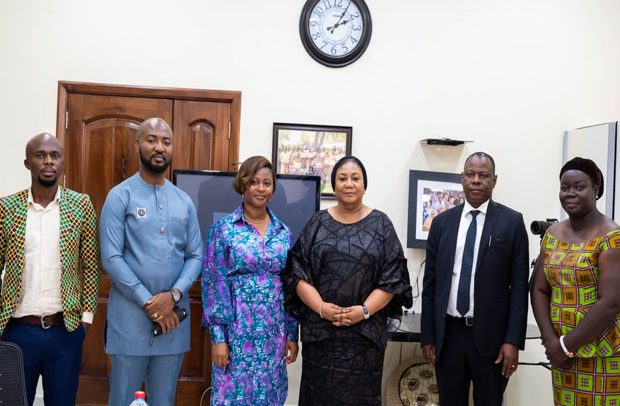Mrs. Akufo-Addo with officials of Roche and GHS
First Lady, Mrs. Rebecca Akufo-Addo in partnership with Roche and the Ghana Health Service (GHS), has launched a capacity-building project for breast and cervical cancer in Ghana.
The project is to help reduce the high incidences of the disease in the country.
It is being implemented in the West Gonja, Birim Central, and Sekyere South, districts of the country.
Over 90 health workers would receive training under the project to screen and treat breast and cervical cancer at the districts’ primary healthcare levels.
The GHS has indicated that breast and cervical cancer cause significant morbidity and mortality in Ghana.
In 2020, an estimated 4,400 cases of breast cancer and 2,797 cases of cervical cancer were recorded with almost 50 per cent of deaths.
The Rebecca Foundation, therefore, through the Organisation of African First Ladies for Development, secured funding from Roche, a multinational healthcare company, to undertake the project.
Under the project, Thermal Coagulation Machines have been purchased to be distributed to the district hospitals in the three project areas to assist in treating cervical cancer right at that level.
Mrs. Rebecca Akufo-Addo, who is the Executive Director of the Rebecca Foundation expressed regret that various studies indicated more cases of breast and cervical cancer were being recorded in the country.
She said reasons including late detection, inadequate access to information, stigma, and fear, could be accounted for the trend.
“The tragedy is that many of these women succumb to the disease. We cannot afford to lose them, and we should not have to,” she stated.
Mrs. Akufo-Addo said breast and cervical cancer survival, especially in more advanced countries, had improved over the last few decades, attributed to early detection through effective screening and treatment options made possible through cancer research.
“It is in this light that I took advantage of the support offered by Roche to improve the response and treatment for breast and cervical cancer in Ghana. This project will need the full commitment of Municipal and District Chief Executives.”
Mrs. Akufo-Addo said the already purchased thermal coagulation machines for the health centres in the training districts were not enough, hence more machines were needed.
She said further support would be needed to help scale up the training in the operational districts, as well as to support community awareness creation.
She commended the Ghana AIDS Commission and many other leading experts who had contributed to the project, expressing the hope that together “we will get ahead of breast and cervical cancers in Ghana.”
Director-General, GHS, Dr. Patrick Kuma-Aboagye, said strategies to address cancer required partnerships and multi-stakeholder inputs to ensure that “we can prevent cancer, detect them early and improve patient outcomes.”
He attributed the significant poor outcomes in Ghana largely due to poor awareness, a limited number of screening sites, and trained health workers to screen and manage cancers, among other things.
However, he said despite the challenges, Ghana had made significant strides to address cancer challenges at the national level with the launch of the Non-Communicable Disease (NCD) Policy and the formation of the NCD Multi-sectoral Steering Committee.
He said strategic partnerships being used for the project would go a long way “to empower the Primary Health Care – which is the foundation of our health system.”
Acting Programme Manager, NCD GHS, Dr. Efua Commeh, said the three districts were selected for the project because they needed such interventions, as well as increased sensitisation and awareness creation on the two most prevailing female cancers.
Lead Access, Policy, and Governmental Affairs, Roche, John Klu, said his organisation was ready to support concerns of women aside from its support to childhood cancers in Ghana.
Legal Advisor and Strategist of The Rebecca Foundation, Sheela Sakyi-Oppong, said the project was expected to increase awareness and sensitisation for women to see the need to visit the hospitals regularly to be screened for the two cancers.
She expressed the hope that the success of the project would propel more support from other stakeholders to scale it up to other districts around the country.
By Jamila Akweley Okertchiri

